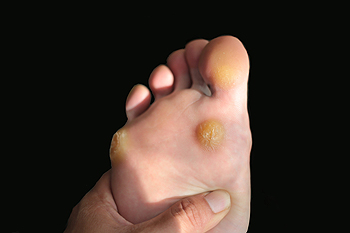What is a Plantar Wart?
Monday, 18 June 2018 00:00 There are many different types of warts, and a condition known as plantar warts appear on the sole of the foot. While warts on other parts of the body may grow out, plantar warts grow into the heel of the foot as a result of the pressure the foot endures while standing and walking. This typically causes considerable pain and discomfort and may appear as bumpy growths on the sole of foot. It comes from the human papilloma virus, which is also known as the HPV virus, and may enter the body through small scrapes or cuts. This particular type of virus is known to be contagious and generally thrives in public swimming areas and showers. It may be beneficial to wear appropriate shoes while in these areas which may aid in preventing the spreading of this condition. If you are afflicted with plantar warts, it’s advised to consult with a podiatrist so proper treatment can be obtained.
There are many different types of warts, and a condition known as plantar warts appear on the sole of the foot. While warts on other parts of the body may grow out, plantar warts grow into the heel of the foot as a result of the pressure the foot endures while standing and walking. This typically causes considerable pain and discomfort and may appear as bumpy growths on the sole of foot. It comes from the human papilloma virus, which is also known as the HPV virus, and may enter the body through small scrapes or cuts. This particular type of virus is known to be contagious and generally thrives in public swimming areas and showers. It may be beneficial to wear appropriate shoes while in these areas which may aid in preventing the spreading of this condition. If you are afflicted with plantar warts, it’s advised to consult with a podiatrist so proper treatment can be obtained.
Plantar warts can be very uncomfortable. If you need your feet checked, contact Dr. Scott Shrem from Garden State Foot & Ankle Center. Our doctor will assist you with all of your foot and ankle needs.
About Plantar Warts
Plantar warts are the result of HPV, or human papillomavirus, getting into open wounds on the feet. They are mostly found on the heels or balls of the feet.
While plantar warts are generally harmless, those experiencing excessive pain or those suffering from diabetes or a compromised immune system require immediate medical care. Plantar warts are easily diagnosed, usually through scraping off a bit of rough skin or by getting a biopsy.
Symptoms
- Lesions on the bottom of your feet, usually rough and grainy
- Hard or thick callused spots
- Wart seeds, which are small clotted blood vessels that look like little black spots
- Pain, discomfort, or tenderness of your feet when walking or standing
Treatment
- Freezing
- Electric tool removal
- Laser Treatment
- Topical Creams (prescription only)
- Over-the-counter medications
To help prevent developing plantar warts, avoid walking barefoot over abrasive surfaces that can cause cuts or wounds for HPV to get into. Avoiding direct contact with other warts, as well as not picking or rubbing existing warts, can help prevent the further spread of plantar warts. However, if you think you have developed plantar warts, speak to your podiatrist. He or she can diagnose the warts on your feet and recommend the appropriate treatment options.
If you have any questions please feel free to contact our office located in Hazlet, NJ . We offer the newest diagnostic and treatment technologies for all your foot and ankle needs.
Blog Archives
- April 2025
- March 2025
- February 2025
- January 2025
- December 2024
- November 2024
- October 2024
- September 2024
- August 2024
- July 2024
- June 2024
- May 2024
- April 2024
- March 2024
- February 2024
- January 2024
- December 2023
- November 2023
- October 2023
- September 2023
- August 2023
- July 2023
- June 2023
- May 2023
- April 2023
- March 2023
- February 2023
- January 2023
- December 2022
- November 2022
- October 2022
- September 2022
- August 2022
- July 2022
- June 2022
- May 2022
- April 2022
- March 2022
- February 2022
- January 2022
- December 2021
- November 2021
- October 2021
- September 2021
- August 2021
- July 2021
- June 2021
- May 2021
- April 2021
- March 2021
- February 2021
- January 2021
- December 2020
- November 2020
- October 2020
- September 2020
- August 2020
- July 2020
- June 2020
- May 2020
- April 2020
- March 2020
- February 2020
- January 2020
- December 2019
- November 2019
- October 2019
- September 2019
- August 2019
- July 2019
- June 2019
- May 2019
- April 2019
- March 2019
- February 2019
- January 2019
- December 2018
- November 2018
- October 2018
- September 2018
- August 2018
- July 2018
- June 2018
- May 2018
- April 2018
- March 2018








